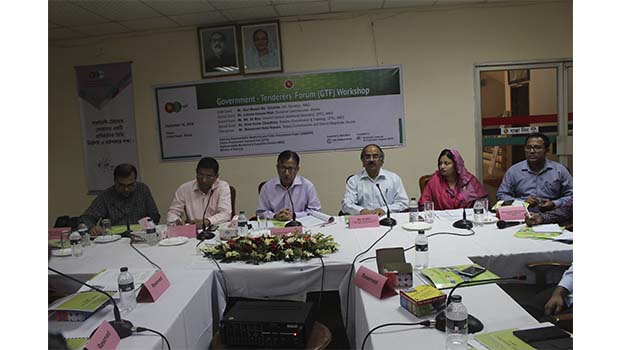Speed up project work to turn BD into rich nation

Bangladesh’s graduation into a developed nation by the year 2041 largely depends on appropriate implementation of the mammoth development programmes undertaken by the government which can be achieved with sincere and coordinated efforts of all concerned.
Though the national budget is increasing gradually to mobilize huge development funds, the capacity of the government officials and the project implementing agencies is not yet satisfactory for which the rate and the quality of ADP schemes is not fully satisfactory.
Abul Mansur Md. Faizullah, Secretary, Implementation Monitoring and Evaluation Division (IMED), Planning Ministry made this observation while speaking at a workshop as the chief guest at Circuit House in Khulna on Sunday.
The workshop was organised to gather ideas and recommendations from all stakeholders on institutionalizing Government-Tenderers’ Forum (GTF) - a platform of procuring entities and tenderers to exchange views, ideas and experiences on procurement including e-GP.
At the workshop, speakers emphasized that GTF would helpestablish sustainable public procurement system in the country and for making the forums sustainable and more effective a central body like Bangladesh Government-Tenderers’ Forum (BGTF) needs to be established.
Md. Ali Noor, Director General (Additional Secretary), the Central Procurement Technical Unit (CPTU) under the IMED, Ministry of Planning, Nishchint Kumar Poddar, Additional Divisional Commissioner, Khulna, and Shish Haider Chowdhury, Director (Training and Coordination), CPTU, IMED delivered speeches as special guests. Ishrat Jahan, Deputy Director, Local Government, Khulna, presided over the workshop.
Ali Noor said, the CPTU is providing all sorts of supports to the tenderers in resolving any disputes that arises while in the tender project to project implementation stages and for making its efforts smoother it is now working to establish government-tenderers forum for better coordination.
GTFs have been formed in every district and the CPTU is frequently holding meetings with them. From the recommendations that came from all stakeholders, both in the government agencies and tenders, we are now working to establish BGTF at the central level.
CPTU is working to bring transparency and accountability in procuring process and making project works sustainable, he said adding, procurement guidelines needs to be made simpler so everyone can understand, he added.
Khadija Bilkis, Senior Deputy Director, BCCP, Shafiul Alam, Senior Communications Consultant, CPTU, IMED spoke at the workshop.
Abul Mansur Md. Faizullah said, the lack of proper skills in preparation of project documents, lax in monitoring and absence of sincerity and honesty of the concerned officials and tenderers are mainly responsible for slow progress in ADP implementation. IMED secretary said, in order to achieve the target of reaching a developed nation, the government has given top priority on effective utilization of public money through proper and timely implementation of various projects under its annual development program (ADP).
Country’s growth would be more than 8 percent, he reiterated saying “Presently the country’s GDP growth rate is higher compared to the global average of 2 to 3 percent. Bangladesh’s development can be compared globally as its uplift programme has touched world standard.
The workshop was organized by CPTU under Digitizing Implementation Monitoring and Public Procurement Project (DIMAPPP) of the World Bank and facilitated by Bangladesh Center for Communication Program (BCCP).
Shish Haider Chowdhury said: “Public procurement is very important as it is done using public money. We want to ensure value for money by ensuring efficiency in spending budget through making development effective.” “We prefer amicable solutions to all problems regarding procurement process through receiving the suggestions from concerned stakeholders,” he added.
Khadija Bilkis said, a central forum of government-tenderers titled Bangladesh Government-Tenderers’ Forum (BGTF) will be formed aiming to ensure full digitization by 2021.




